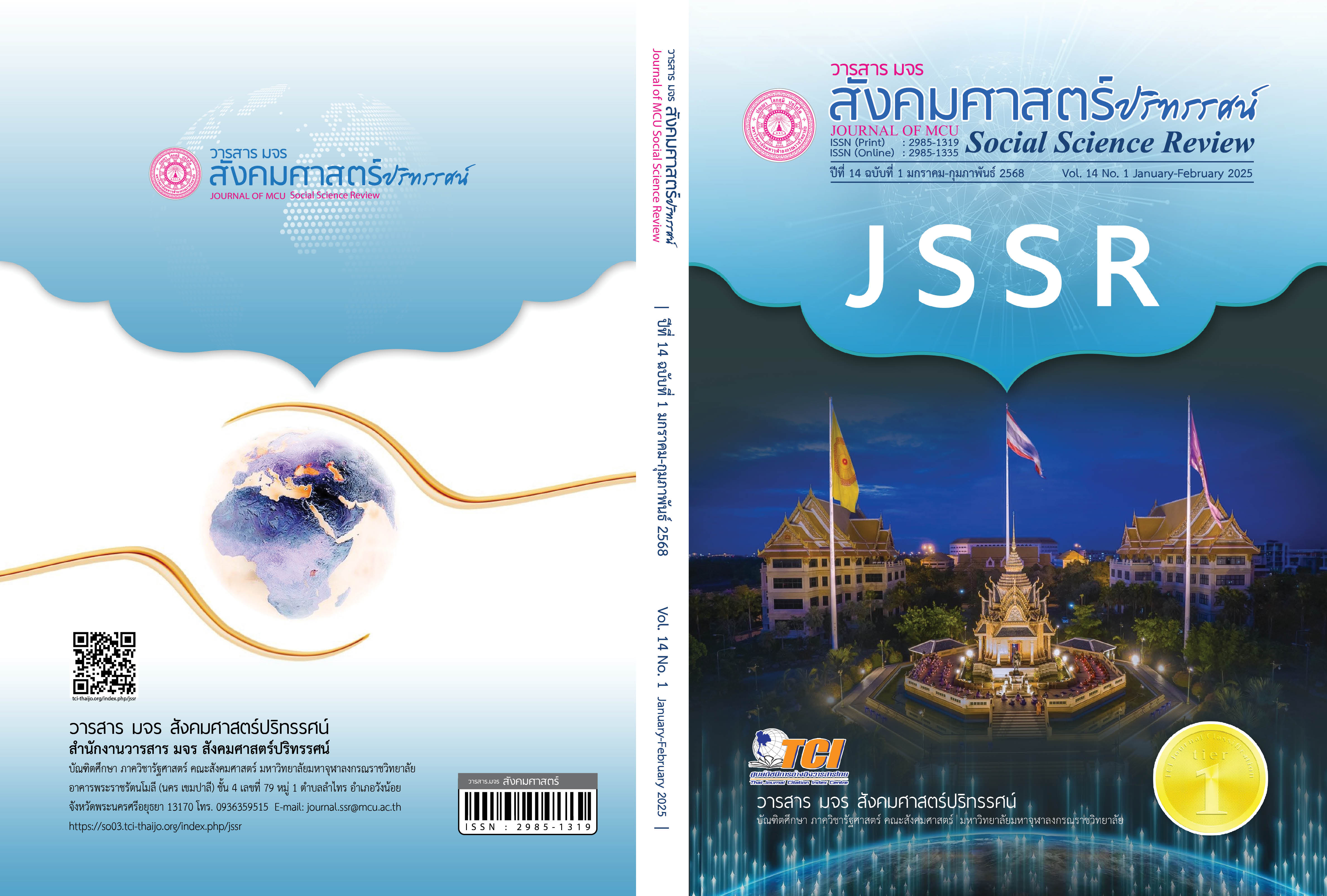การพัฒนารูปแบบการจัดการสุขภาวะองค์รวมของพระภิกษุสามเณรในเขตจอมทอง กรุงเทพมหานคร โดยการมีส่วนร่วมของภาคีเครือข่าย
คำสำคัญ:
สุขภาวะองค์รวม, พระภิกษุสามเณร, การบริหารแบบมีส่วนร่วมบทคัดย่อ
บทความวิจัยครั้งนี้มีวัตถุประสงค์ 1. ศึกษาสภาพทั่วไปของการจัดการสุขภาวะองค์รวม 2. ปัจจัยที่ส่งผลต่อการจัดการสุขภาวะ และ 3. พัฒนารูปแบบการจัดการสุขภาวะองค์รวมของพระภิกษุสามเณรในเขตจอมทองโดยการมีส่วนร่วมของภาคีเครือข่าย ใช้การวิจัยแบบผสานวิธี ได้แก่ การวิจัยเชิงปริมาณ เชิงคุณภาพ และเชิงปฏิบัติการแบบมีส่วนร่วม เก็บข้อมูลจากพระสงฆ์สามเณร 352 รูป และผู้ให้ข้อมูลสำคัญ 12 รูปหรือคน วิเคราะห์ข้อมูลเชิงปริมาณด้วยสถิติพื้นฐานและการวิเคราะห์องค์ประกอบ ส่วนเชิงคุณภาพใช้การวิเคราะห์เนื้อหาและการวิเคราะห์แบบอุปนัย
ผลการวิจัยพบว่า 1. สภาพทั่วไปของการจัดการสุขภาวะองค์รวม 1. ด้านสุขภาวะทางกาย มีค่าเฉลี่ยระดับมาก โดยการพักผ่อนเพียงพอและการออกกำลังกายได้รับคะแนนสูงสุด ข้อมูลเชิงคุณภาพยืนยันว่ามีระบบส่งเสริมสุขภาพที่ดี 2. ด้านสุขภาวะทางจิต มีค่าเฉลี่ยสูงสุด โดยการมีสมาธิในการทำกิจกรรมเป็นปัจจัยหลัก ซึ่งได้รับการสนับสนุนผ่านสมาธิภาวนาและการสวดมนต์ 3. ด้านสุขภาวะทางสังคม พบว่าพระอาจารย์มีบทบาทสำคัญในการดูแล โดยกิจกรรมสังฆกรรมและการประชุมสงฆ์ช่วยเสริมสร้างความสัมพันธ์ 4. ด้านสุขภาวะทางปัญญา เน้นการนำหลักธรรมมาประยุกต์ใช้ โดยมีการบูรณาการศึกษาพระปริยัติธรรมกับหลักไตรสิกขา 2. ในส่วนของปัจจัยที่ส่งผลต่อการจัดการสุขภาวะองค์รวม พบว่า ปัจจัยการขับเคลื่อนสุขภาวะและพฤติกรรมมีความสัมพันธ์เชิงบวกอย่างมีนัยสำคัญที่ระดับ 0.01 แต่ไม่มีผลโดยตรงต่อสุขภาวะในแต่ละด้าน 3. รูปแบบการจัดการสุขภาวะองค์รวมที่พัฒนาขึ้นมีการบูรณาการหลักพุทธธรรมกับการดูแลสุขภาพ มุ่งเน้นการบริหารแบบมีส่วนร่วม การดำเนินงานที่เป็นระบบ และการติดตามประเมินผลอย่างต่อเนื่อง
เอกสารอ้างอิง
เกียรติศักดิ์ สุขเหลือง. (2567). การพัฒนาต้นแบบวิทยากรพระธรรมทูตสุขภาวะเพื่อการส่งเสริมสุขภาวะและป้องกันกลุ่มอาการอ้วนลงพุงในพระสงฆ์จังหวัดน่าน. วารสาร มจร สังคมศาสตร์ปริทรรศน์, 7(3), 112-113.
ชลธิชา จิรภัคพงค์ และคณะ. (2561). สุขภาวะพระสงฆ์: การพัฒนารูปแบบสุขภาวะตามแนววิถีพุทธโดยการบูรณาการสาธารณสุขเพื่อคุณภาพชีวิตที่ดีของจังหวัดลำปาง. พระนครศรีอยุธยา: มหาวิทยาลัยมหาจุฬาลงกรณราชวิทยาลัย.
พระครูไพโรจน์ธรรมคุณ. (2562). กระบวนการพัฒนาสุขภาวะเชิงพุทธบูรณาการของชุมชนในจังหวัดปทุมธานี (ดุษฎีนิพนธ์พุทธศาสตรดุษฎีบัณฑิต สาขาวิชาการพัฒนาสังคม). พระนครศรีอยุธยา: มหาวิทยาลัยมหาจุฬาลงกรณราชวิทยาลัย.
พระครูสุวิธานพัฒนบัณฑิต. (2558). การพัฒนารูปแบบการดูแลสุขภาพองค์รวมของพระสงฆ์ในจังหวัดขอนแก่น โดยเน้นการมีส่วนร่วมของเครือข่าย. วารสารสำนักป้องกันควบคุมโรคที่ 6 จังหวัดขอนแก่น, 22(2), 117-118.
พระราชบัญญัติสุขภาพแห่งชาติ พ.ศ. 2550. (2550). ราชกิจจานุเบกษา, 124(16 ก), 1.
ศรีเมือง พลังฤทธิ์. (2562). สถานะสุขภาพและแนวทางการสร้างเสริมสุขภาพของพระภิกษุสงฆ์อำเภอเมือง จังหวัดปทุมธานี. วารสารการพยาบาลและการดูแลสุขภาพ, 37(2), 133-142.
สำนักงานคณะกรรมการสุขภาพแห่งชาติ (สช.). (2560). ธรรมนูญสุขภาพพระสงฆ์แห่งชาติ พุทธศักราช 2560. นนทบุรี: บริษัท โอ.เอส. พริ้นติ้ง เฮาส์ จำกัด.
สำนักงานเจ้าคณะเขตจอมทอง. (2566). รายงานการขับเคลื่อนกิจการคณะสงฆ์ทั้ง 6 ด้าน คณะสงฆ์เขตจอมทอง กรุงเทพมหานคร ปี พ.ศ. 2566. กรุงเทพฯ: สำนักงานเจ้าคณะเขตจองทอง.
สุวรีย์ ศิริโภคาภิรมย์. (2546). การวิจัยทางการศึกษา. ลพบุรี: ฝ่ายเอกสารการพิมพ์สถาบันราชภัฏเทพสตรี.
อุ่นเอื้อ สิงห์คำ. (2557). กระบวนการและผลของการสร้างเสริมสุขภาวะองค์รวมวิถีพุทธ. วารสารสมาคมนักวิจัย, 19(1), 73-85.
ดาวน์โหลด
เผยแพร่แล้ว
รูปแบบการอ้างอิง
ฉบับ
ประเภทบทความ
สัญญาอนุญาต
ลิขสิทธิ์ (c) 2025 วารสาร มจร สังคมศาสตร์ปริทรรศน์

อนุญาตภายใต้เงื่อนไข Creative Commons Attribution-NonCommercial-NoDerivatives 4.0 International License.
เพื่อให้เป็นไปตามกฎหมายลิขสิทธิ์ ผู้นิพนธ์ทุกท่านต้องลงลายมือชื่อในแบบฟอร์มใบมอบลิขสิทธิ์บทความให้แก่วารสารฯ พร้อมกับบทความต้นฉบับที่ได้แก้ไขครั้งสุดท้าย นอกจากนี้ ผู้นิพนธ์ทุกท่านต้องยืนยันว่าบทความต้นฉบับที่ส่งมาตีพิมพ์นั้น ได้ส่งมาตีพิมพ์เฉพาะในวารสาร มจร สังคมศาสตร์ปริทรรศน์ เพียงแห่งเดียวเท่านั้น หากมีการใช้ภาพหรือตารางหรือเนื้อหาอื่นๆ ของผู้นิพนธ์อื่นที่ปรากฏในสิ่งตีพิมพ์อื่นมาแล้ว ผู้นิพนธ์ต้องขออนุญาตเจ้าของลิขสิทธิ์ก่อน พร้อมทั้งแสดงหนังสือที่ได้รับการยินยอมต่อบรรณาธิการ ก่อนที่บทความจะได้รับการตีพิมพ์ หากไม่เป็นไปตามข้อกำหนดเบื้องต้น ทางวารสารจะถอดบทความของท่านออกโดยไม่มีข้อยกเว้นใดๆ ทั้งสิ้น





